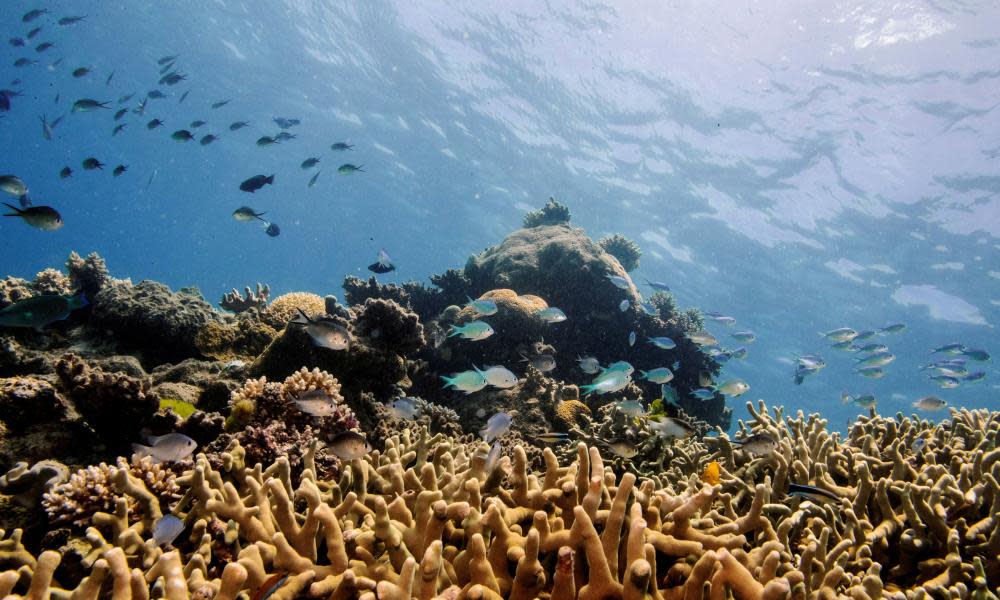Coalition criticised after Great Barrier Reef Foundation receives $351,000 in jobkeeper payments

Labor has asked the Morrison government to explain why a Great Barrier Reef-focused charity received jobkeeper despite still having hundreds of millions of dollars remaining from a nearly $500m grant it received three years ago.
The Great Barrier Reef Foundation, which expanded from six to 38 full-time staff after accepting a $443m grant that it did not request from the Turnbull government in 2018, confirmed it received about $351,000 in jobkeeper payments in the 2019-20 financial year.
It received another $50,000 from a federal program to boost cashflow for small and medium-sized businesses and not-for-profit organisations during the pandemic.
Labor wrote to the federal treasurer, Josh Frydenberg, asking him to confirm and justify the payments after they were reported in the Australian Financial Review.
The opposition environment spokesperson, Terri Butler, said Labor welcomed more investment in conservation of the reef but was “deeply concerned” the foundation had received the money given the Australian National Audit Office reported in May that $286m of the grant remained unspent.
“Scott Morrison’s incompetent and neglectful administration of public money is getting worse by the day,” she said.
The 2018 grant to the foundation by then-prime minister Malcolm Turnbull and Frydenberg, then the environment minister, was criticised after it was awarded without a tender process or explanation of why it was given to an organisation that had annual revenue of less than $8m when there were existing government agencies with expertise in the area.
At the time, the government said the money would be spent over six years to address poor water quality, the impact of the crown-of-thorns starfish and improving the resilience of corals to climate change.
The foundation’s managing director, Anna Marsden, said the foundation was eligible for jobkeeper as it met the criteria – it was a not-for-profit charity and its revenue was expected to fall by at least 15% in the third quarter last year compared with the same period in 2019. She said its revenue ultimately fell by 42% across this period due to the Covid-19 pandemic.
Marsden said the money from the reef trust partnership was received in full in 2018 and not considered assessable revenue under the jobkeeper criteria. The GST on the full amount of the grant was paid in June of that year.
She said the foundation’s revenue, not counting the transformational grant, fell 4% from the 2019 to the 2020 financial year.
The foundation’s annual report for 2019-20 showed it had $428m in assets, including $141.7m in cash and cash equivalents and $206.3m in term deposits.
Marsden said the reef trust partnership was “a distinct project with a program of on-ground reef protection activities which must be kept separate from other foundation operations and activities”.
“This grant is governed by a contract with clear rules that all expenditure must be spent in the delivery of on-ground reef-saving projects, and cannot be used for the foundation’s general operational administrative expenses,” she said.
Frydenberg said the government would not comment on the tax affairs of any individual or entity “due to its obligations of confidentiality under the law”.
He said jobkeeper had been highly successful, having helped “to keep businesses in business and Australians in jobs during the greatest economic crisis since the great depression”. The treasurer cited a reserve bank estimate that the scheme had saved 700,000 jobs.
Staff hired by the reef foundation since receiving the grant include the coral specialist Prof Ove Hoegh-Guldberg, who is its chief scientist. Writing for Guardian Australia this week with Peter Thomson, the UN secretary general’s special envoy for the ocean, Hoegh-Guldberg urged “drastic action” to cut global greenhouse gas emissions at the UN Cop26 climate conference in Glasgow in November.
The pair quoted evidence from the Intergovernmental Panel on Climate Change that between 70% and 90% of warm water coral reefs would disappear if global heating reached 1.5C above pre-industrial levels and coral reefs would be “vanishingly rare” at 2C.
They said the reef had been “severely damaged” by unprecedented marine heatwaves but could be part of a solution to the climate crisis if supported, including through restoration of blue carbon stocks – mangroves, wetlands and seagrasses.

 Yahoo Movies
Yahoo Movies 
